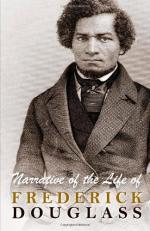|
|
The Narrative of the Life of Frederick Douglass Chapter 7
During the seven years in the Auld household, Douglass succeeds in learning how to read. This, he accomplishes through diligence and clever tactics. For not only does Mrs. Auld ceases to teach him, she becomes extremely vigilant in preventing his further advancement, becoming harsher even than her husband. Douglass befriends as many white kids around the neighborhood as he can and receives lessons from them. He carries his lesson book with him so that whenever he has time between his errands, he studies. He exchanges bread for instruction, especially from the poorer white kids who have less to eat than he does. Although Douglass wishes to acknowledge some of these kids by name, he resists on account of not wanting to embarrass or harm them in any way. He recounts talking with some of them about his desire for freedom, and they would sympathize with his plight.
When Douglass is about twelve years old, he obtains a book entitled, The Columbian Orator. The book opens up for him a vast storehouse of ideas on freedom, truth, and liberty. But along with these newfound thoughts, there is also a painful realization of his current condition under slavery. The warnings of Mr. Auld comes true-knowledge torments Douglass's soul. He comes to hate both the institution of slavery as well as the people who sustain it. Many times, Douglass regards learning as a curse rather than a blessing. But he becomes curious about the abolitionist movement, something he initially knows nothing about. One day, Douglass, unasked, helps two Irishmen unload at the wharf. Afterward, one of them asks if he is a slave for life. Douglass answers that he is. The Irishmen, quite affected, advise him to run away to the north. Douglass pretends to be uninterested, fearing that they might be treacherous men who collect reward money for escaped slaves. But he takes their advice to heart and resolves to run away at the proper time. Thinking that someday he might have to write his own pass to freedom, Douglass devotes his time to learning how to write. He begins by first studying the letters written on the timber at the shipyard. After learning a few letters, he then challenges the white boys to a writing contest. Every new letter learned is copied many times on any writing surface Douglass comes across, such as a fence, wall, or pavement. By this time, his master's son, Thomas, is in grade school. Whenever Douglass is left alone to take care of the house, he writes in Thomas's copybook until he is able to write a similar hand. After many tedious years, Douglass succeeds in learning how to write.




